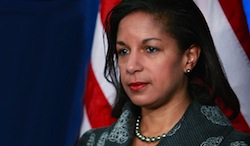New Sanctions May be on the Horizon for Iran
December 11, 2009
Featured Image
We are happy to serve you a daily summary of the day's top nuclear policy stories each morning, with excerpts from the stories in bullet form.
Stories we're following today:
U.S., Allies Warn of New Iran Sanctions - Associated Press
- The United States, Britain and France warned Thursday that Iran risks increased sanctions unless it immediately complies with a series of Security Council resolutions regarding its nuclear program.
- U.S. Ambassador to the U.N. Susan Rice said that while the United States remained committed to engaging Iran and reaching a diplomatic solution, "the time is short."
- "Engagement cannot be a one-way street. Iran must conclusively demonstrate a similar willingness to engage constructively and address the serious issues associated with its nuclear program," Rice said. "Should Iran continue to fail to meet its obligations, the international community will have to consider further actions."
- All three ambassadors expressed disappointment that Iran had failed to accept a proposal backed by International Atomic Energy Agency that would have allowed Tehran to export its uranium for enrichment abroad and have it returned in the form of fuel for nuclear reactors.
Verifying START Successor Pact Might Demand New Levels of Openness - Global Security Newswire [link]
- With U.S. and Russian negotiators in Geneva continuing to hammer out details of a new agreement to reduce their nations' nuclear stockpiles, experts here predicted yesterday the accord would require each side to exercise greater openness about its deployed arsenal than ever before.
- "They'll have to provide more detail than we have provided" previously for confirming the size and composition of each side's deployed nuclear force, Linton Brooks -- former U.S. President George H.W. Bush's chief negotiator on the 1991 Strategic Arms Reduction Treaty -- said yesterday. "And exactly how that works -- without getting you into things that would cause security concerns -- will be hard."
- With the Cold War over, both sides are less concerned than before about the potential for clandestine missile production or warhead uploading that could allow for an all-out surprise nuclear attack. The focus now is more on simply confirming gradual reductions in accordance with agreed limits, rather than on day-to-day monitoring for possible treaty abrogation, issue experts say.
North Korea Agrees on Need for 6-Party Nuclear Talks - Bloomberg [link]
- North Korea said it reached a “common understanding” with the U.S. on the need to resume six-party nuclear disarmament talks after a three-day visit to Pyongyang by President Barack Obama’s envoy.
- The two governments “agreed to continue to cooperate to narrow our remaining differences,” the official Korean Central News Agency reported today, citing an unidentified Foreign Ministry spokesman.
- U.S. Secretary of State Hillary Clinton described the trip as “quite positive” and said the administration is taking an approach of “strategic patience.”
Flying Saucer over Norway? No, Just a Missile Shooting Itself Down - The Guardian [link]
- Witnesses described it as a blue light that seemed to emerge from behind a mountain, while others said it stopped in mid-air and began moving in spirals.
- But it appears the explanation for the giant spiral is much more prosaic – a new Russian nuclear-capable missile suffered a failed test launch. Russian submarine the Dmitry Donskoi test-fired the Bulava missile from the White Sea. It failed at the third stage, the Russian defence ministry confirmed.
- Felgenhauer said the dazzling lights over Norway were typical of a missile failure. "Such lights and clouds appear from time to time when a missile fails in the upper layers of the atmosphere and have been reported before," he said. "At least this failed test made some nice fireworks for the Norwegians."
- Nod to ArmsControlWonk for the video clip.
A View from the Dark Side
The Disarmament President - Wall Street Journal Editorial [link]
- So it's worth checking in to see how his disarmament vision is faring in the rougher world of rogues and national interest. The answer is not so well.
- The Administration decided that rather than negotiate an extension of the existing Start treaty, a whole new arrangement to limit warheads and delivery systems should be crafted. In July, the U.S. and Russia signed a "framework agreement" to reduce stockpiles by as much as a third. Alas, the Administration was so focused on the numbers that it neglected the stickier details—such as verification, and whether the current Start regime would stay in place if negotiations dragged on.
- Meanwhile, the world's rogues continue to pursue nuclear weapons, and Mr. Obama said yesterday that "it is incumbent upon all of us to insist that nations like Iran and North Korea do not game the system." He added that "we must develop alternatives to violence that are tough enough to change behavior." But all the President has to show for a year of courting these regimes is their refusal even to consider giving up either their weapons (North Korea) or their growing capacity to make them (Iran).



